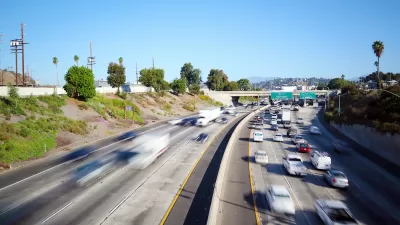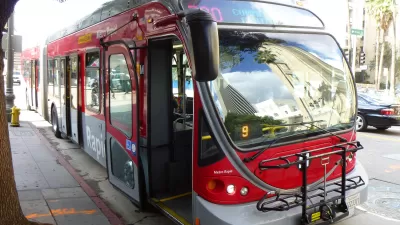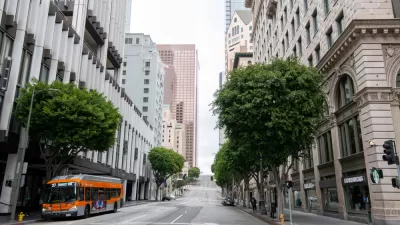The updated language clarifies that projects can include Complete Streets features, items supported by the county's voters through Measure M.

The L.A. County Metro board of supervisors voted on June 24 to approve updates to the county's Highway Program that will allow "for flexibility on future highway-funded projects, many of which are on city streets." Joe Linton reports on the story for Streetsblog Los Angeles, writing, "[t]he Metro Highway Program had blocked complete streets features from being included in projects funded by some Metro sales tax revenue. Now, where appropriate, these projects can include features that support transit, bicycling, and walking."
Despite a voter-approved sales tax measure that "defined 'Highway Construction' as projects on 'public highway and street rights-of-way… includ[ing] Complete Streets, Green Streets, and active transportation improvements such as bikeways and pedestrian improvements,'" the Metro Highway Program's guidelines "did not acknowledge this voter-approved, multimodal direction."
Linton writes that "[t]he short-term effects of the new policy will not be dramatic, but two Long Beach projects that were essentially put on hold by the Gateway Cities Council of Governments can now move forward with Metro funding. Hopefully, in the longer term, Highway Program projects will include more multimodal components, providing the broad range of transportation options that voters approved in Measure M."
FULL STORY: Metro Board Approves Highway Program Modernization

Planetizen Federal Action Tracker
A weekly monitor of how Trump’s orders and actions are impacting planners and planning in America.

Restaurant Patios Were a Pandemic Win — Why Were They so Hard to Keep?
Social distancing requirements and changes in travel patterns prompted cities to pilot new uses for street and sidewalk space. Then it got complicated.

Map: Where Senate Republicans Want to Sell Your Public Lands
For public land advocates, the Senate Republicans’ proposal to sell millions of acres of public land in the West is “the biggest fight of their careers.”

Maui's Vacation Rental Debate Turns Ugly
Verbal attacks, misinformation campaigns and fistfights plague a high-stakes debate to convert thousands of vacation rentals into long-term housing.

San Francisco Suspends Traffic Calming Amidst Record Deaths
Citing “a challenging fiscal landscape,” the city will cease the program on the heels of 42 traffic deaths, including 24 pedestrians.

California Homeless Arrests, Citations Spike After Ruling
An investigation reveals that anti-homeless actions increased up to 500% after Grants Pass v. Johnson — even in cities claiming no policy change.
Urban Design for Planners 1: Software Tools
This six-course series explores essential urban design concepts using open source software and equips planners with the tools they need to participate fully in the urban design process.
Planning for Universal Design
Learn the tools for implementing Universal Design in planning regulations.
Heyer Gruel & Associates PA
JM Goldson LLC
Custer County Colorado
City of Camden Redevelopment Agency
City of Astoria
Transportation Research & Education Center (TREC) at Portland State University
Camden Redevelopment Agency
City of Claremont
Municipality of Princeton (NJ)





























